Understanding the Role of the Moscow Patriarchate in the Russian Invasion of Ukraine
by His Eminence Archbishop Elpidophoros of the Greek Orthodox Archdiocese of America
A Talk delivered at Archangel Michael Greek Orthodox Church, Port Washington, New York, on April 4, 2022
I am including this in today’s Post, because I think Archbishop Elpidophoros says many things which greatly need to be said at this point in history.
____________________________________________________
 This… is a sorrowful and, indeed, painful subject for us all.
This… is a sorrowful and, indeed, painful subject for us all.
This unjust, fratricidal war must not be laid at the feet of our Russian sisters and brothers, who are being deceived and victimized by their leaders – both civil and religious. Even the poor Russian soldiers being sent as cannon fodder into Ukraine deserve our sympathy and our prayers. But for those committing atrocities, there will be justice – in this life or the next.
The images coming out of Bucha fill our hearts with much pain and righteous outrage. And as we contemplate the loss of innocent life – especially of children – I ask this one thing: please join me in a moment of silent prayer to our Lord Jesus Christ on behalf of all those who are suffering.
Thank you, and thank you for standing in solidarity with the People of Ukraine. Thank you for extending mercy and compassion to all victims of this barbarity, especially for those who are suffering most directly in Ukraine as they defend their homeland. They have seen their fellow citizens – innocent, non-combatants – brutally and mercilessly slaughtered by the invaders.
But it is too easy just to condemn those in Russia. We must also extend our compassion to those who are standing up and speaking out against this immoral and senseless conflict; to those mourning the deaths of their sons, who were sent to die for the vanity and madness of others; and to the ordinary people, who are suffering from sanctions that their rulers – political and ecclesiastical alike – avoid without harm. Thank you as well for standing with all those who are defending the truth against the onslaught of lies being perpetrated to justify this unjustifiable war – with deceit being sown even here in the United States.
When we think of the “role” of the Moscow Patriarchate in this conflict, the first thing we must marvel at is the question itself. Should it not be clear that the Church – by its very nature – is opposed to such a fabricated conflict? We should all certainly hope so! But what is more insidious, is the fact that the attackers themselves are the Christian brothers and sisters of the very ones they are being sent to kill and destroy!
It calls to mind what Abraham Lincoln said during America’s bloody Civil War, just a few weeks before it ended: “Both read the same Bible and pray to the same God, and each invokes His aid against the other.” * 1
This invasion is of one sovereign Nation by another. But make no mistake; it is causing a needless, religious civil war.
In this respect, responsibility for condoning such unrighteousness rests squarely on the leadership of the Russian Church and clearly on Patriarch Kirill.
We all remember what the members of the Sanhedrin cried out, as the unjust Pilate sat in judgment against our Lord Jesus Christ: “We have no king but Caesar!” * 2
From the words and actions of Patriarch Kirill, we can conclude he has made the same bargain with Putin and his cronies. This is, indeed, a sad moment for our Church, and the whole world is watching.
And these actions are in stark contrast to the Moscow Patriarchate’s own Metropolitan of Kyiv, His Eminence Onuphry, who has stood with his flock despite the silence of his brother bishops across the border. One can only hope that the Ukrainian Orthodox – who are divided between the Autocephalous Orthodox Church of Ukraine, under His Beatitude Metropolitan Epiphanios, and the Ukrainian Orthodox Church of the Moscow Patriarchate – will find a bridge of fraternity and solidarity to come together as Orthodox Christian brethren, so as to sustain their fellow Ukrainians.
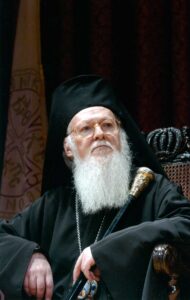
In the meantime, even as we learn from tonight’s dialogue, let us take to heart the words of His All-Holiness Ecumenical Patriarch Bartholomew.
(goa)
Just a few days ago, among Ukrainian refugees in Poland, our Patriarch taught us all how we must approach those whose lives are being ruined – Ukrainians and Russians alike – by this unconscionable war:
“[C]ontinue to remember that – but for the grace of God – anyone of us could be in their vulnerable position; Then your hearts will melt. Their fears will become your fears, their pain will penetrate your own body, their hopes will become your hopes, and this entire crisis will be the standard by which your identity and love are measured and judged.”
Let us pray to the Lord. Lord have mercy.
- 1 Second Inaugural Address, March 4, 1865.
- 2 John 19:15
The Fifth Sunday of Great Lent
Saint Mary of Egypt
I love this story.
In the Fourth Century it was the custom for monks of Saint Sava’s Monastery (below Jerusalem, near the Jordan River) to spend Lenten weekdays alone in the desert. A priest-monk Zosimas was walking near the Jordan one day, when 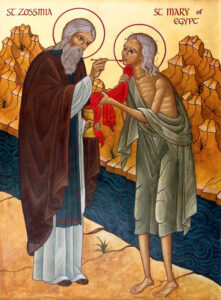 he saw someone ahead. A woman’s voice called out: Don’t come near; I’m not decent. She was dressed in rags. Zosimas left his cloak and drew back, while she covered herself. Then he drew near. She said: You are the first person I’ve spoken to in 47 years.
he saw someone ahead. A woman’s voice called out: Don’t come near; I’m not decent. She was dressed in rags. Zosimas left his cloak and drew back, while she covered herself. Then he drew near. She said: You are the first person I’ve spoken to in 47 years.
And she old him her story.
Courtesy of Orthodox Church in America
Her name was Mary. She came from Alexandria. In her teens she had become a high-class prostitute and had been one for seventeen years. She had been in Jerusalem (presumably “on business”?) and had been caught up in a crowd of pilgrims going into the new Church of the Resurrection (the Anastasis) who were venerating the True Cross. (I wonder: was she seeking?) When she got to the door, she could not enter. It was like a physical barrier – and she knew it was because she was unworthy
Suddenly what she was, all her shame swept over her. She found herself kneeling in the street before an icon of the Theotokos, promising to change her ways.
Kontakion for Sundays in Lent – Saint Symeon’s Church (OCA), Birmingham, Alabama
Then she went back to the church in repentance, walked in and venerated the Holy Cross. Mary soon left the city; its temptations were too much. We can repent of sin quite sincerely, and yet the temptation comes back. Old habits are not easily broken, as we all know. So Mary fled into the desert, had lived alone and had found inner peace.
She wanted to remain alone, so she swore Zosimas to secrecy, but asked him to return next Lent and bring Holy Communion, 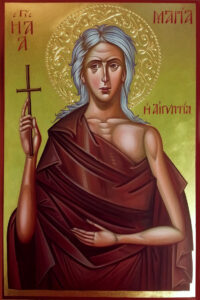 which he did. As he approached the Jordan Mary was on the east bank, and to his amazement she walked to him across on the waters. He administered the Eucharist. She asked him to return next year.
which he did. As he approached the Jordan Mary was on the east bank, and to his amazement she walked to him across on the waters. He administered the Eucharist. She asked him to return next year.
This time she was not waiting. He found her body in a hut with a note: “Abba Zosimas please bury the remains of humble Mary. I died the day I received Communion. Pray for me.” (Her body had remained incorrupt that whole year.) Before he could begin digging, a lion came out of the desert and began to dig her grave *, and so she lay in peace.
- So many Orthodox saints have “adopted” wild animals.
Zosimas was now free to tell her story. Archbishop Sophronios of Jerusalem was so moved by it that he had it written down. It spread among the faithful near and far, and that’s how we know about Saint Mary of Egypt today.
Repentance
Saint Mary of Egypt, our Lenten image of repentance. The Church commemorates her two weeks before Pascha in order to urge us to repent of our sins before the Great Feast, and also to remind us that all sin, no matter how bad, can be forgiven.
 Ohio Department of Transportation
Ohio Department of Transportation
You know that the New Testament Greek word for repentance (μετάνοια) means liiterally to “turn around”: in our mind and heart and soul and body, turn away from sin, turn towards God and His will and His love, get our lives headed right again. Repentance is a positive thing, a turning away from darkness into light, from Satan towards God, from misery towards joy. You know that sin doesn’t make us happy, not for long. Sin is poison, makes us go dead on the inside, finally destroys us.
That is why our Lord Jesus told us in extremely clear terms to “cut it out”: “If your eye causes you to sin, pluck it out. If your hand causes you to sin, cut it off. Better to enter into life maimed with one eye, one hand, than to go to hell where the worm never dies and the fire is never quenched.” Matthew 5:29 Is that clear enough?
The Lord was trying to wake us up, shock us. He spoke figuratively, of course: Don’t go cutting off your hand. (It’s said the great Christian philosopher Origen of Alexandria, who was greatly tempted by lust, took this passage literally and… … you don’t want to hear about it.) Christ is saying: If there is anything unworthy in your life, get rid of it. Do not throw your life away on trash and finally wind up in the garbage dump of Gehenna. We cannot take our sins into Heaven. “Nothing unclean can enter there.” Revelation 21:27 So if you plan to hang onto your sins, you’ll have to take them, um…. “elsewhere”.
Because, brothers and sisters, this is serious: One day sooner or later each of us will see this road sign: You do not know when that day will come. Therefore, repent today. You don’t know if you’ll have a tomorrow. Today, whatever you need to do to get your life shaped up, do it.
You do not know when that day will come. Therefore, repent today. You don’t know if you’ll have a tomorrow. Today, whatever you need to do to get your life shaped up, do it.
Saint Mary of Egypt did what she needed to do. You do what you need to do.
Holy Confession: The Sacrament of Repentance
Oh, no! the priest is going to talk about Confession again.
Don’t stop reading. This is the Church’s appointed way to help us recognize our sins and turn our lives around. If you go to Confession, this is a reminder to do it again. If you have not gone to Confession in a while, or maybe never, I’m telling you here why you should do so and how to do it.
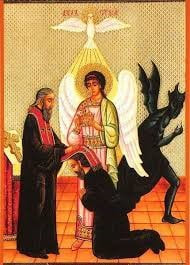 Keep in mind, first, that Orthodox Confession is not a legal procedure to get us off the hook. Orthodox Confession is “therapeutic”; it’s intended to help us get healthy spiritually.
Keep in mind, first, that Orthodox Confession is not a legal procedure to get us off the hook. Orthodox Confession is “therapeutic”; it’s intended to help us get healthy spiritually.
(Church of Saint Alban and Saint Chad, Nottingham, England, UK)
This Sacrament was given to the apostles by Christ on Pascha night. “If you forgive anyones’ sins they are forgiven, if you retain anyones’ sins they are retained.” John 20:23 Nor should that be understood in terms of a legal “power” possessed by the clergy. (We’ll say more about that on Thomas Sunday.)
Most Orthodox bishops and priests tell people they should go to Confession. It’s no secret that many Orthodox do not do so. For a long time in most Orthodox circles Confession was ignored or became just an empty formality. (I once went to Divine Liturgy at a certain Orthodox Church. Before it began, a long line of people went up to the priest, said something very quickly, he laid his “stole” over their heads, and they left. Afterwards I asked what that was, and was told it was Confession. That was Confession?!)
In recent times ever more Orthodox have been making genuine Confessions, trying to deal with their sins. However, my perception is that most Orthodox still don’t make use of this grace-filled, healing Sacrament. Therefore, some while back, I wrote a Post on the subject which tells you more than you could possibly want to know about Confession. And here it is:
The Fifth Sunday of Great Lent
Epistle: Hebrews 9:11-14
In Old Testament times, once a year the high priest went behind a curtain and entered the tabernacle the Holy of Holies in the temple. Hebrews sees that as a symbol of how Christ, passing through the “curtain” of death, entered a greater more perfect tabernacle, the true Holy of Holies, into Heaven. Thus, by His own blood, He offered Himself as a spotless sacrifice to cleanse us from sin and lead us to the living God.
Gospel Reading: Mark 10:32-45
Jesus is now leading the apostles up to Jerusalem. They are amazed that He should walk into this death trap – and afraid. He tells them again, as He did last Sunday, that He will be betrayed, killed and on the third day rise again.
James and John still aren’t listening. They now understand that He is headed for Glory. but they think it will come easily. And so: This is our big chance! Lord, can we be second and third in command in Your kingdom? After all they, with Peter, were the ones closest to Jesus.
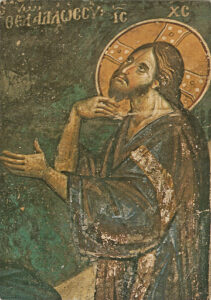 Christ responds: “Do you know what you’re asking? Can you drink the cup I drink?” He will soon pray in Gethsemane: “Fatber, take this cup away from me.” “Yes, we can!” they cry – brash immature young men! When the other Ten heard about this they were indignant. Why? Because they wanted to be top dogs. None of them understood.
Christ responds: “Do you know what you’re asking? Can you drink the cup I drink?” He will soon pray in Gethsemane: “Fatber, take this cup away from me.” “Yes, we can!” they cry – brash immature young men! When the other Ten heard about this they were indignant. Why? Because they wanted to be top dogs. None of them understood.
Next three icons with permission of Saint Isaac’s Skete, skete.com
So Jesus explained Chrisian leadership. “In the world rulers lord it over people:, their great ones exercise authority. It shall not be so among you. With you whoever wants to be great must be your δούλος (doulos, “slave”, “servant”); whoever wants to be first must be δούλος of all. Even as I came not to be served but to serve, and give My life a ransom * for many.”
- This, I think, is the only time Christ said He would be a “ransom”. (This is a very minor theme in the New Testament.) To whom did He pay a ransom? Certainly not to His loving Father. Saint Basil’s Liturgy says He paid “a ransom to death”.
In the world many great ones still bully their way around, ordering, conniving, manipulating, lying, in order to get others to do what they want, while they themselves “get away with murder”. (Has this ever happened in the Church? I can’t remember…)
But, by the direction of our Lord and Master, that is not how we Christians are to do it: bishops, priests, parish council members, Christian parents, teachers, managers, CEOs, politicians, governors, presidents. God allows His people to have authority not so they can get their own way or advance their careers or build up their egos and their fortunes – but only so they can serve others.
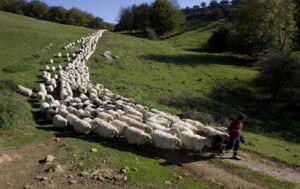 Note in the Gospel reading: “Jesus was going before them.” This reflects the old Middle Eastern way of shepherding: “The Lord is my Shepherd. He leads me beside still waters.” Psalm 23
Note in the Gospel reading: “Jesus was going before them.” This reflects the old Middle Eastern way of shepherding: “The Lord is my Shepherd. He leads me beside still waters.” Psalm 23
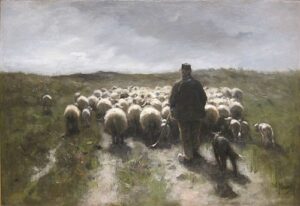 In the Western world shepherds and their dogs traditionally drive the sheep ahead of them. (I’ve seen it in Wales.) I fear Western culture still often reflects this.
In the Western world shepherds and their dogs traditionally drive the sheep ahead of them. (I’ve seen it in Wales.) I fear Western culture still often reflects this.
Anton Mauve, c 1880
Christian authorities do not push from behind.
Most authorities of all sorts today are called lead-ers – a title that has lost its obvious meaning. However, the fact is that for all authorities (not just for Christians) this is the way that actually works in the long run. Presidents: you want your country to be united? Lead the way: stop running around being divisive. Parents: you want your children to be honest? First be honest yourself. I know many of you do this. I see our Orthodox families functioning this way. I know all the serving and leading that goes into the life of the typical parish church – offered so graciously and generously – which inspires others to do the same.
After Pentecost, the apostles suffered and died willingly, because their Master had suffered and died before them.
 Today our Good Shepherd is still going before us, leading all who will follow Him through life, through death and on into the Resurrection. That is Christian Leadership.
Today our Good Shepherd is still going before us, leading all who will follow Him through life, through death and on into the Resurrection. That is Christian Leadership.
 Holy Week
Holy Week
Palm Sunday is now only nine days away. Prepare to let your Lord Jesus lead you through Holy Week. Learn from Him. Let Him show you how to do it.
And then it will be your turn: You lead others by following Him.
Next Week: We’ll begin our usual twice-daily Holy Week Posts, beginning with Lazarus Saturday.
